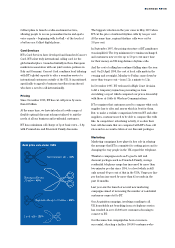BT 1998 Annual Report Download - page 21
Download and view the complete annual report
Please find page 21 of the 1998 BT annual report below. You can navigate through the pages in the report by either clicking on the pages listed below, or by using the keyword search tool below to find specific information within the annual report.F I N A N C I A L R E V I E
than in the 1998 or 1996 financial years reflected a reduction
in working capital in the 1997 financial year.
Tax paid in the 1998 financial year totalled £1,886 million.
It was particularly high because of £561 million advance
corporation tax paid in October 1997 in respect of the
special dividend and £255 million paid in December 1997 as
the first windfall tax instalment. This advance corporation
tax will reduce the group’s overall tax payment in the 1999
financial year. The tax paid in the 1997 financial year,
principally relating to the prior year’s profit, amounted to
£1,045 million and the increase of £261 million on the
previous year was mainly due to the higher level of profit
made in the 1996 financial year compared with the prior year.
The UK Government is changing the pattern of corporation
tax payments from April 1999 by requiring companies to
pay tax in quarterly instalments starting at the half year
stage in each financial year. The changes are being phased
in and are in place of the current main single corporation
tax payment made nine months after the financial year end
and advance corporation tax payments associated with
dividends. It is expected that the effect of these accelerated
payment arrangements will be to increase the tax payments
to be made by the group in the 2000 and 2001 financial
years, notwithstanding the reduction in the standard rate
of corporation tax to 30% announced by the Government
for those years.
Net cash outflow of £3,108 million for capital expenditure
and financial investment in the 1998 financial year mainly
comprises expenditure on plant, equipment and property
and compares with £2,820 million in the 1997 financial year
and £2,500 million in the 1996 financial year.
The net cash outflow on acquisitions totalled £1,501 million
in the 1998 financial year, the principal part of which was
the investment in Cegetel.
Equity dividends paid in the 1998 financial year totalled
£3,473 million and included the special dividend of
£2,244 million in September 1997. In the two previous
financial years dividends of £1,217 million and
£1,138 million were paid.
The resulting cash outflow, before liquid resources and
financing, of £4,052 million in the 1998 financial year was
mainly financed by the issue of new loans in the first two
months of the year, principally two Eurobonds totalling
US $2,500 million, and by using the group’s existing
short-term investments. In the two previous financial
years, the group had positive net cash inflows before
financing of £638 million and £1,130 million, respectively.
The cash outflow caused mainly by the special dividend
payment and the investment in Cegetel resulted in net debt
rising to £3,977 million at 31 March 1998. Balance sheet
gearing stood at 36 per cent at that date.
In the 1998 financial year, the group bor rowed £1,637
million in long-term loans and long-term debt repaid
totalled £338 million. BT issued a US$1.5 billion five-year
63⁄4%Eurobond in April 1997 and a US$1.0 billion ten-year
7% Eurobond in May 1997 in preparation for the group’s
cash requirements later in 1997.
The cash dividend payment has been reduced by
£18 million as the company’s scrip dividend scheme
operated for the first time in the 1998 financial year.
3.8 million new shares were issued as a consequence as
further described in note 22 to the financial statements.
Treasury policy
The group has a centralised treasury operation. Its primary
role is to manage liquidity, funding, investment and the
group’s financial risk, including risk from volatility in
currency and interest rates and counterparty credit risk.
The treasury operation is not a profit centre and the
objective is to manage risk at optimum cost.
The Board sets the department’s policy and its activities
are subject to a set of controls commensurate with the
magnitude of the investments and borrowings under its
management. Counterparty credit risk is closely monitored
and managed within controls set by the Board. Derivative
instruments including forward foreign exchange contracts
are entered into for hedging purposes only.
Capital resources and foreign currency exposure
The directors have a reasonable expectation that the
group has adequate resources to continue in operational
existence for the foreseeable future and therefore they
continue to adopt the going concern basis in preparing
the financial statements.
At 31 March 1998, the group had cash and short-term
investments of £793 million. At that date, £550 million of
short-term debt was outstanding. In addition, the group had
























